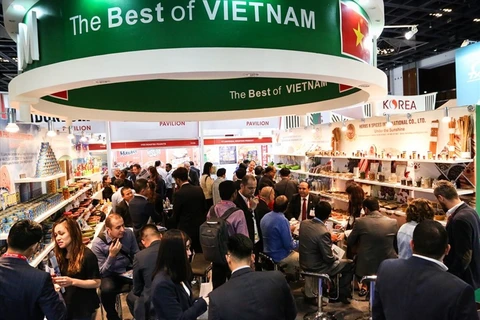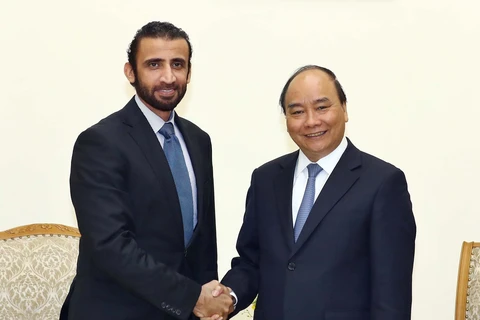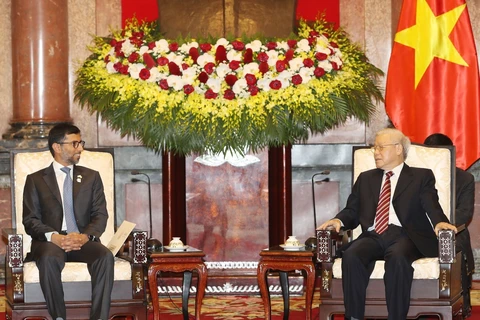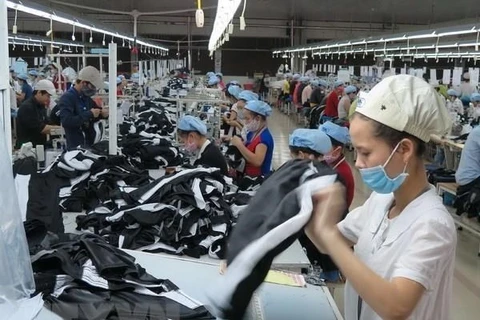Hanoi (VNA) – Recommendations were offered to Vietnamese exporters during a seminar held in Hanoi on May 24 to discuss promoting trade with the Middle East.
Head of the West Asia – Africa Office under the Ministry of Industry and Trade (MoIT)’s Department of Asia – Africa Markets Nguyen Minh Phuong said many Vietnamese firms suffer losses when it comes to seeking partners or making transactions in the Middle East, which sometimes take place online. Some of them are ready to transfer thousands of USD as deposits without thoroughly checking information about their partners.
Meanwhile, a number of the Middle East partners frequently change contract terms unilaterally but all costs are put on the Vietnamese side. In case the Vietnamese refuse to do that, they are willing to cancel the contracts.
Bui Thi Thanh An, deputy head of the Trade Promotion Agency, said the Middle East – Africa lie in a strategically important location, bordering Asia, Europe and Africa and serving as a goods transit point. In particular, the United Arab Emirates is the world’s third largest goods transit markets.
Vietnam’s exports to the Middle East are mostly fruits and vegetables, aquatic products, mobile phones, footwear, textiles and apparel, rice, pepper, wood and wooden furniture, cashew nuts, and coffee, she said.
Pham Hoai Linh from the Department of Asia – Africa Markets suggested that domestic firms learn about Halal standards, habits and customs of Islamic residents to access their markets.
Via face-to-face contacts, she said they could avoid risks and invite partners to Vietnam to visit materials zones, as well as manufacturing and processing facilities to improve mutual trust for the sake of joint success.
She also suggested that they hire consultants to know how to bring products to the region.
The MoIT and its Department of Asia – Africa Markets in particular were advised to hold more trade promotion programmes so the Vietnamese enterprises could form networking and navigate the market.
Tran Van Tan Cuong, Director of the Halal Development Consultancy Company, said Halal standard is key for Vietnamese firms to enter the Middle East, adding that Halal food and standards could become the global standards in the future.
In order to meet Halal standards, firms will be trained in building a management system, registration and many others.-VNA
Head of the West Asia – Africa Office under the Ministry of Industry and Trade (MoIT)’s Department of Asia – Africa Markets Nguyen Minh Phuong said many Vietnamese firms suffer losses when it comes to seeking partners or making transactions in the Middle East, which sometimes take place online. Some of them are ready to transfer thousands of USD as deposits without thoroughly checking information about their partners.
Meanwhile, a number of the Middle East partners frequently change contract terms unilaterally but all costs are put on the Vietnamese side. In case the Vietnamese refuse to do that, they are willing to cancel the contracts.
Bui Thi Thanh An, deputy head of the Trade Promotion Agency, said the Middle East – Africa lie in a strategically important location, bordering Asia, Europe and Africa and serving as a goods transit point. In particular, the United Arab Emirates is the world’s third largest goods transit markets.
Vietnam’s exports to the Middle East are mostly fruits and vegetables, aquatic products, mobile phones, footwear, textiles and apparel, rice, pepper, wood and wooden furniture, cashew nuts, and coffee, she said.
Pham Hoai Linh from the Department of Asia – Africa Markets suggested that domestic firms learn about Halal standards, habits and customs of Islamic residents to access their markets.
Via face-to-face contacts, she said they could avoid risks and invite partners to Vietnam to visit materials zones, as well as manufacturing and processing facilities to improve mutual trust for the sake of joint success.
She also suggested that they hire consultants to know how to bring products to the region.
The MoIT and its Department of Asia – Africa Markets in particular were advised to hold more trade promotion programmes so the Vietnamese enterprises could form networking and navigate the market.
Tran Van Tan Cuong, Director of the Halal Development Consultancy Company, said Halal standard is key for Vietnamese firms to enter the Middle East, adding that Halal food and standards could become the global standards in the future.
In order to meet Halal standards, firms will be trained in building a management system, registration and many others.-VNA
VNA
























